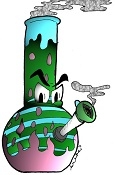After the media storm surrounding Trudeau's initiative on
legalizing marijuana, it's a question that's on everyone's mind: is marijuana “
better” or “
worse” than alcohol?

Extensive research of physical and psychological effects reveal that alcohol consumption is clearly riskier for
short-term use. Why? There are some insignificant risks that we all take when having a few drinks, from making a fool of yourself in front of the one person you wanted to impress at a party to waking up with a hangover so debilitating you decide to not leave your bed for the day - or week. However, drinking excessively in a short amount of time can lead to fatal overdose, and it happens more than you think; on average, six people per day die of
alcohol poisoning in the U.S alone (Washington Post).
The “
magic number” for blood alcohol concentration (BAC) is 0.34%: at this point, you're at the gambling between a horrible hangover and fatal overdose, but many deaths have been reported at the 0.3% mark. To put this into perspective, it would take a 140-pound woman 10 shots over the span of 1 hour to reach a deadly BAC of 0.31.
Click here to find what your BAC level would be after a certain number of drinks according to your body weight.

In contrast,
large doses of marijuana are extremely unlikely to kill you - there has never been a report of death caused solely by overdose on marijuana. Multiple studies have been carried out on animals by researchers who hoped to find a “
lethal dosage”. The original plan was to give animals the substance until 50% of them die, but this wasn't possible in most cases. Small animals (mice or rats) could consume 1000mg per kilogram of body weight before they were at risk of death. For larger animals, even after being given as much as 3000 mg per kilogram of body weight, they had not reached a fatal dosage. One can conclude for humans that a person who weighs 140 pounds would need to uptake more than 4 pounds of marijuana to be at the same level as the larger animals, and they still would not have consumed a
fatal dosage.
Although death by marijuana is almost impossible, there is a negative short-term adverse effect of ingesting too much marijuana that is commonly known as “
greening out”. Symptoms include pupil dilation, vomiting or nausea, and temporary hallucinations and anxiety. When caused by marijuana, these symptoms subside on their own within minutes or hours after use. If they do not pass, there is a high chance that the drug contained unanticipated additional stronger chemicals, especially if purchased off the streets; in this case, medical attention should be obtained. Another obvious downfall of short-term (or long term) recreational use of marijuana is that it is currently
illegal in Canada no matter how old you are, and if you are caught by authorities, serious consequences follow.

When it comes to consistent long-term use, both alcohol and marijuana have the potential to be detrimental in different ways. Over time, excessive alcohol consumption affects the heart, liver, and pancreas. As a result, high blood pressure, heart and/or liver disease are common chronic illnesses experienced by alcoholics. Long-term use of marijuana hasn't been as strongly linked to deadly diseases as alcohol has, but it has been proven to have severe negative effects on the brain.
An Australian study compared the white brain matter of people who used cannabis for an average of 15 years, and people who have never tried it
[1]. The results revealed that there was more than an 80% reduction of white brain matter in the brains of users. Most of the long-term users had been using marijuana since 16 years old, but it was discovered that those who started using the drug at a younger age (10 or 11) caused even more white brain reduction. Damage to white brain matter has been linked to significant
changes in the hippocampus, which is associated mainly with memory. This explains the study's finding that long-term users have trouble remembering things and learning new things.

Memory impairment and learning or concentration deficits are not deadly, but are certainly life-altering. It is also important to note that long-term use of marijuana makes it more likely for predisposed people to develop schizophrenia and other mental illnesses.
In closing, advocating for the use of either alcohol or marijuana is not the right approach as both could harm your body, impair judgement, and
lead to addiction. What should be encouraged is understanding your limits and taking the proper precautions to stay safe. If you or someone you know is struggling with addiction, check out
my previous article to find help near you.

 Extensive research of physical and psychological effects reveal that alcohol consumption is clearly riskier for short-term use. Why? There are some insignificant risks that we all take when having a few drinks, from making a fool of yourself in front of the one person you wanted to impress at a party to waking up with a hangover so debilitating you decide to not leave your bed for the day - or week. However, drinking excessively in a short amount of time can lead to fatal overdose, and it happens more than you think; on average, six people per day die of alcohol poisoning in the U.S alone (Washington Post).
Extensive research of physical and psychological effects reveal that alcohol consumption is clearly riskier for short-term use. Why? There are some insignificant risks that we all take when having a few drinks, from making a fool of yourself in front of the one person you wanted to impress at a party to waking up with a hangover so debilitating you decide to not leave your bed for the day - or week. However, drinking excessively in a short amount of time can lead to fatal overdose, and it happens more than you think; on average, six people per day die of alcohol poisoning in the U.S alone (Washington Post).
 In contrast, large doses of marijuana are extremely unlikely to kill you - there has never been a report of death caused solely by overdose on marijuana. Multiple studies have been carried out on animals by researchers who hoped to find a “lethal dosage”. The original plan was to give animals the substance until 50% of them die, but this wasn't possible in most cases. Small animals (mice or rats) could consume 1000mg per kilogram of body weight before they were at risk of death. For larger animals, even after being given as much as 3000 mg per kilogram of body weight, they had not reached a fatal dosage. One can conclude for humans that a person who weighs 140 pounds would need to uptake more than 4 pounds of marijuana to be at the same level as the larger animals, and they still would not have consumed a fatal dosage.
In contrast, large doses of marijuana are extremely unlikely to kill you - there has never been a report of death caused solely by overdose on marijuana. Multiple studies have been carried out on animals by researchers who hoped to find a “lethal dosage”. The original plan was to give animals the substance until 50% of them die, but this wasn't possible in most cases. Small animals (mice or rats) could consume 1000mg per kilogram of body weight before they were at risk of death. For larger animals, even after being given as much as 3000 mg per kilogram of body weight, they had not reached a fatal dosage. One can conclude for humans that a person who weighs 140 pounds would need to uptake more than 4 pounds of marijuana to be at the same level as the larger animals, and they still would not have consumed a fatal dosage.
 When it comes to consistent long-term use, both alcohol and marijuana have the potential to be detrimental in different ways. Over time, excessive alcohol consumption affects the heart, liver, and pancreas. As a result, high blood pressure, heart and/or liver disease are common chronic illnesses experienced by alcoholics. Long-term use of marijuana hasn't been as strongly linked to deadly diseases as alcohol has, but it has been proven to have severe negative effects on the brain.
When it comes to consistent long-term use, both alcohol and marijuana have the potential to be detrimental in different ways. Over time, excessive alcohol consumption affects the heart, liver, and pancreas. As a result, high blood pressure, heart and/or liver disease are common chronic illnesses experienced by alcoholics. Long-term use of marijuana hasn't been as strongly linked to deadly diseases as alcohol has, but it has been proven to have severe negative effects on the brain.
 Memory impairment and learning or concentration deficits are not deadly, but are certainly life-altering. It is also important to note that long-term use of marijuana makes it more likely for predisposed people to develop schizophrenia and other mental illnesses.
Memory impairment and learning or concentration deficits are not deadly, but are certainly life-altering. It is also important to note that long-term use of marijuana makes it more likely for predisposed people to develop schizophrenia and other mental illnesses.